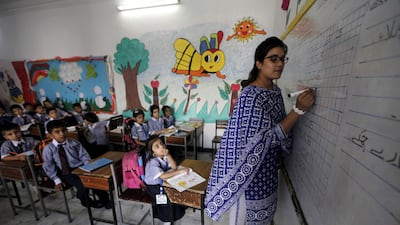While there exist different schools of thought on economic development, one area of near unanimous agreement is the importance of improving the education of the labour force.
The Arabian Gulf countries have all designated this as a central component of their economic visions and significant reforms have been enacted during the past 10 years, many of which focus on enhancing school and teacher accountability. But is there a risk that such policies might backfire?
Educational reform experts and economists have been espousing the role of accountability in enhancing educational outcomes for decades. Under the traditional public schooling system, principals and educators receive salaries unrelated to performance and have contracts that are virtually guaranteed. Such an arrangement gives both types of workers zero material incentive to deliver a good service and students will, in principle, have to rely on educational workers’ intrinsic motivations to perform well on the job.
The goal of accountability reforms is to create a clear link between performance and earnings, including job security, thereby accentuating the incentive to deliver a good service. This proposal stems from the plethora of alternative work domains where performance pay of some sort is successfully deployed as a productivity-enhancing technique: salespeople; doctors; actors, repairmen; waiters; and architects all face financial penalties for bad performance and reap financial benefits when their performance is good. Extending the system to teachers and management in schools is a logical next step.
In the Gulf countries, one manifestation has been the establishment of independent, quality-assurance regulators. For example, in Bahrain, private schools that earn a good score from the Education and Training Quality Authority are allowed to raise their tuition fees at a higher rate than those with average performance.
Theoretically, such efforts, if applied narrowly, can potentially backfire due to their impact on the supply of workers in the educational sector. In particular, accountability creates stress, which can adversely affect a worker’s job satisfaction. If wages do not rise to compensate for the added stress of being monitored and graded, then the result of higher accountability might be higher worker turnover and lower-quality entrants into the field, as prospective and current teachers seek less stressful alternatives. Thus, while the performance of those who remain is likely to improve in response to the changing incentives, the quality of those who remain might deteriorate, and if this latter effect is stronger then the result of accountability reforms will be worse outcomes.
_______________
Read more:
Economics 101: Is energy-efficient housing a waste of money?
Economics 101: How should Arabian Gulf countries regulate privatised industries?
_______________
Further, there is the possibility of getting stuck in vicious circles, whereby a school that performs badly loses its best staff, and can’t attract the staff necessary to improve, while elite teachers immovably congregate in elite schools.
In a paper titled "How does school accountability affect teachers?", forthcoming in the Journal of Human Resources, University of Chicago (US) professor Rebecca Dizon-Ross investigated these possibilities using data from New York City. Legislation such as the No Child Left Behind Act has contributed to reforms designed to increase accountability based on the transparent evaluation of schools. Interestingly, she found mixed results: in weaker schools, receiving an initially bad grade subsequently resulted in higher performance, which Prof Dizon-Ross attributed to the principals exerting higher effort in the pursuit of superior outcomes. In the better schools, in contrast, she found the reverse result: performing badly led to a subsequent deterioration in quality, as the schools struggled to attract good teachers.
New York City is not the Gulf, so it is not immediately clear if we should expect analogous results in Gulf schools. However, these findings do raise an important point that policymakers should keep in mind when they formulate educational reforms: changing the rules affects behaviour, but it also affects the pool of talent entering the industry; consequently, pre-emptive studies need to account for both channels when making policy recommendations.
For example, the privatisation programme of Saudi Arabia’s vision 2030 seeks to expand the private sector’s role in education as a way of enhancing accountability. The New York City experience suggests that such reforms may need to be accompanied by improvements in the financial compensation associated with teaching. Around 50 years ago, when the Gulf countries’ educational systems were still very young, society looked favourably upon the teaching profession and afforded teachers high status, which is an important consideration for prospective talent. This channel was reinforced by the limited job opportunities for women, which helped ensure that elite female members of the workforce were attracted to teaching.
Today, after socio-economic reforms, women have much greater opportunities to secure high-paying positions such as CEOs and senior civil servants, rendering teaching relatively unattractive. Societal views have adapted as a result and, today, being a teacher has much lower status than it used to have. Consequently, the pool of talent interested in teaching and managing in educational establishments is arguably of lower quality than before.
Higher compensation, along with more stringent hiring criteria, might reverse this trend, especially if it is complemented by cultural reforms designed to rehabilitate the social status of teachers.
Omar Al-Ubaydli (@omareconomics) is a researcher at Derasat, Bahrain.


